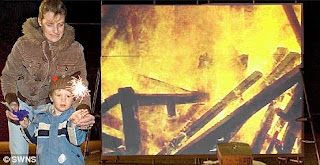
A few thoughts (and many thanks) to you, Dear Reader, as the year closes...
Wow! New Year's Eve and a blue moon!
#####
"New Year's Day: Now is the accepted time to make your regular annual good resolutions. Next week you can begin paving hell with them as usual."
- Mark Twain
"A New Year's resolution is something that goes in one year and out the other."
- Author Unknown
"An optimist stays up until midnight to see the new year in. A pessimist stays up to make sure the old year leaves."
- ?
"For last year's words belong to last year's language
And next year's words await another voice.
And to make an end is to make a beginning."
-T.S. Eliot, "Little Gidding"
"We will all open a book today. Its pages are blank. We are going to write words on them. Each of us will be using only our own words on our own pages. The book is called the New Year and its first chapter is opening now."
- ?
"May God bless and keep you always,
May your wishes all come true,
May you always do for others
And let others do for you.
May you build a ladder to the stars
And climb on every rung,
May you stay forever young."
- Bob Dylan
"We spend January 1 walking through our lives, room by room, drawing up a list of work to be done, cracks to be patched. Maybe this year, to balance the list, we ought to walk through the rooms of our lives... not looking for flaws, but for potential."
- Ellen Goodman
"Drop the last year into the silent limbo of the past. Let it go, for it was imperfect, and thank God that it can go."
- Brooks Atkinson
#####
From the Keeper Of The Word Farm...
Memorize your favorite poem.
Spend some time alone. In a field, near a lake, alongside a stream... What words may come?
Read more books and watch less TV. A good book is an old friend. Revist old friends once a year - reread a favorite book from time to time.
Pay attention to words. They can be a source of awe, knowlwdge, humor, thought and tears. Treasure them and enjoy the journey they will give you.
#####
"To me, there are three things we all should do every day. We should do this every day of our lives. Number one is laugh. You should laugh every day. Number two is think. You should spend some time in thought. And number three is, you should have your emotions moved to tears, could be happiness or joy. But think about it. If you laugh, you think, and you cry, that's a full day. That's a heck of a day. You do that seven days a week, you're going to have something special."
- Jim Valvano 1993 ESPY speech
"Yes! To dance beneath a diamond sky
with one hand waving free..."
Wow! New Year's Eve and a blue moon!
#####
"New Year's Day: Now is the accepted time to make your regular annual good resolutions. Next week you can begin paving hell with them as usual."
- Mark Twain
"A New Year's resolution is something that goes in one year and out the other."
- Author Unknown
"An optimist stays up until midnight to see the new year in. A pessimist stays up to make sure the old year leaves."
- ?
"For last year's words belong to last year's language
And next year's words await another voice.
And to make an end is to make a beginning."
-T.S. Eliot, "Little Gidding"
"We will all open a book today. Its pages are blank. We are going to write words on them. Each of us will be using only our own words on our own pages. The book is called the New Year and its first chapter is opening now."
- ?
"May God bless and keep you always,
May your wishes all come true,
May you always do for others
And let others do for you.
May you build a ladder to the stars
And climb on every rung,
May you stay forever young."
- Bob Dylan
"We spend January 1 walking through our lives, room by room, drawing up a list of work to be done, cracks to be patched. Maybe this year, to balance the list, we ought to walk through the rooms of our lives... not looking for flaws, but for potential."
- Ellen Goodman
"Drop the last year into the silent limbo of the past. Let it go, for it was imperfect, and thank God that it can go."
- Brooks Atkinson
#####
From the Keeper Of The Word Farm...
Memorize your favorite poem.
Spend some time alone. In a field, near a lake, alongside a stream... What words may come?
Read more books and watch less TV. A good book is an old friend. Revist old friends once a year - reread a favorite book from time to time.
Pay attention to words. They can be a source of awe, knowlwdge, humor, thought and tears. Treasure them and enjoy the journey they will give you.
#####
"To me, there are three things we all should do every day. We should do this every day of our lives. Number one is laugh. You should laugh every day. Number two is think. You should spend some time in thought. And number three is, you should have your emotions moved to tears, could be happiness or joy. But think about it. If you laugh, you think, and you cry, that's a full day. That's a heck of a day. You do that seven days a week, you're going to have something special."
- Jim Valvano 1993 ESPY speech
"Yes! To dance beneath a diamond sky
with one hand waving free..."
- Bob Dylan


